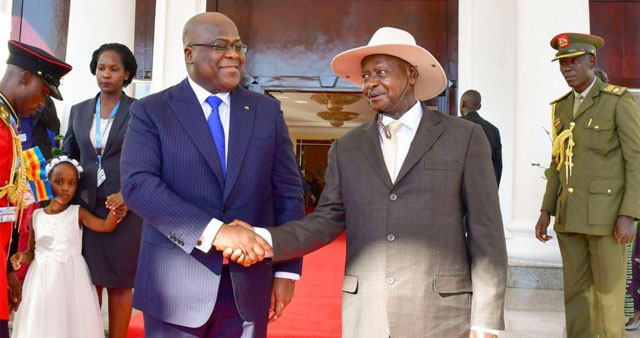
Kampala, Uganda | THE INDEPENDENT | The Constitutional Court has dismissed a petition in which the Embassy of the Democratic Republic of Congo sued the Ugandan government over the sale of its properties in the suburbs of Kampala.
The Embassy had sought to recover a number of its properties that were attached following the ex-parte orders that were given by the High Court of Uganda in a case filed against the then Republic of Zaire by businessmen Emmanuel Bitwireomunda and John Katuramu in 1993 and 1996 respectively.
The properties which consisted of Plot 7B Acacia Avenue Kololo, Plot 14 Mbuya Road, and Plot 12 Salmon Rise Bugolobi, were purportedly allocated to one Onapa by Kampala City Council after two former landlords of the Zaire Government Consular Libatu la Mbonga accused him of failing to pay the monthly rent of USD 11,000 for accommodation facilities in Kasese for 11 months. The Consular was also accused of failing to pay another bill of USD 273,488 and interest of USD 131,738.
The two landlords went to court at different times and won the cases after the DRC government failed to defend the suits. They then asked for execution to attach the properties. As a result, records show that the properties were attached and reportedly taken over by businessman Amos Nzeeyi after successfully securing a certificate of title from the National Housing Construction Company. Nzeyi later transferred the same to Ketan Morjaria.
While the Embassy protested the transactions, the Ministry of Foreign Affairs said that it could not reverse any of them since Ketan had a certificate of title. Accordingly, the Embassy filed a matter before the land division in 2013 where, instead, the court ordered the Embassy to compensate Ketan with USD 600,000 for the portion of the land that it continued to occupy. The Embassy was also asked to pay damages of 50 million Shillings, costs of 73 million Shillings and interest at 36 million Shillings for the encroached part of the land.
In the aftermath, the embassy staff who were previously accommodated in embassy-owned houses were forcefully evicted from the buildings. They then decided to petition the Constitutional Court where they argued that the actions of the agents of the government of Uganda were in breach of the constitution of Uganda that enshrines respect for international law and treaty obligations and the peaceful co-existence with her neighbours.
But the government of Uganda, through the Principal State Attorney Jeffrey Atwine argued that the case was not raising questions for constitutional interpretation.
In their Judgement on Thursday, a panel of five Justices led by Deputy Chief Justice Richard Buteera dismissed the case on grounds that the court didn’t have jurisdiction to entertain the remedies sought. The other Justices on the panel included Kenneth Kakuru, Lady Justice Catherine Bamugemereire, Christopher Izama Madrama and Irene Mulyagonja.
They argued that the case was mostly touching on issues of the jurisdiction; whether a sovereign state approached the appropriate fora for redress and whether they have jurisdiction to enforce orders already issued by applying the Constitutional interpretation.
According to Justice Bamugemereire, who wrote the lead judgement, the case was wrongly filed before the Constitutional Court. “I find that what the Petitioner seeks from this court is not an interpretation of any provision of the constitution”, wrote Bamugemereire.
She added that although the petitioner has faith in their courts and wanted the earlier orders of the High Court enforced by returning their property, payment of compensation, damages and interests, such a redress can be lawfully enforced through other courts of competent jurisdiction.
“Having resolved the first issue in the negative, I find that it disposes of the whole petition. I, therefore, found no reason to proceed with resolving the subsequent issues,” she said, adding that the constitutional court did not have jurisdiction to entertain the petition.
*******
URN
 The Independent Uganda: You get the Truth we Pay the Price
The Independent Uganda: You get the Truth we Pay the Price



